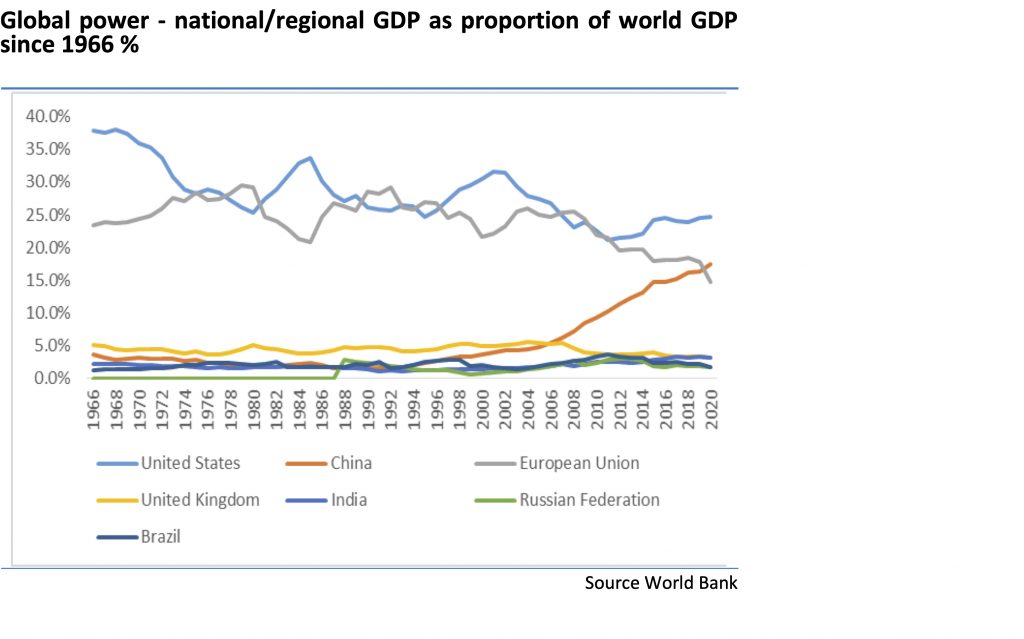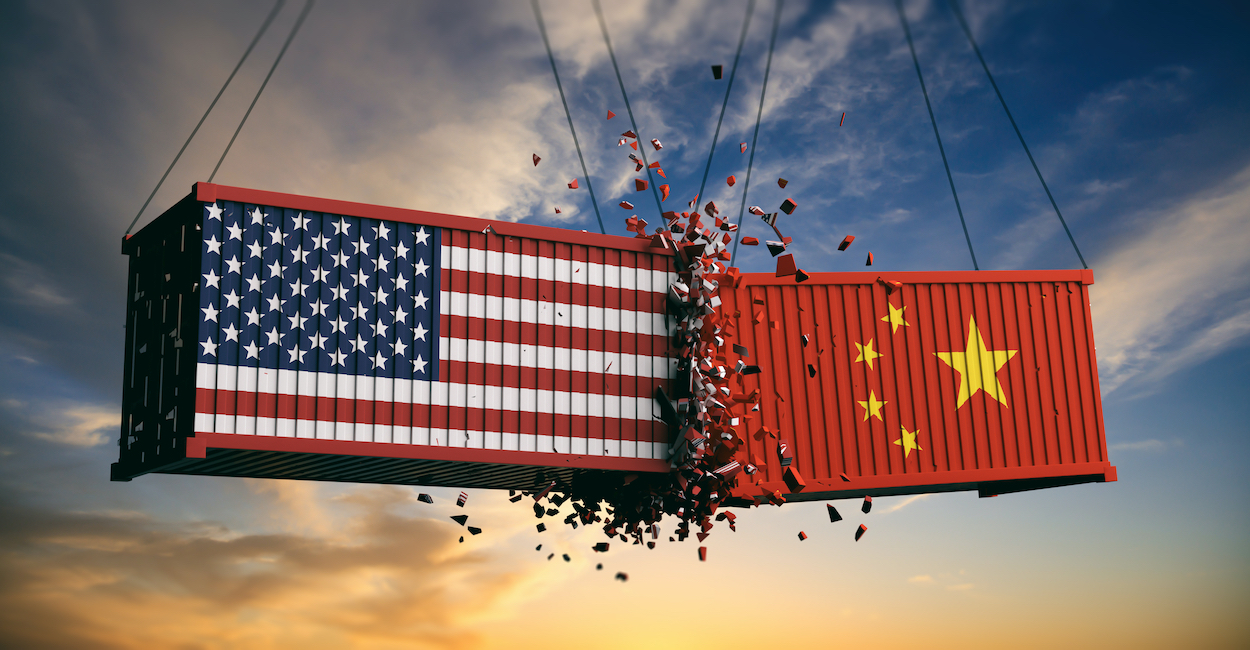By Ewen Stewart – 5 minute read
MUCH has been written about the symbolism of the fall of Kabul. The perception seems to be growing that a mediaeval army has overcome American power (and by association that of the West generally) and shown it has no clothes. China and others will thus conclude the age of US power is drawing to a close, doubtless emboldening their own global ambitions.
One can draw the analogy further. The Soviet Empire did not survive long after it was forced in to a humiliating retreat out of Afghanistan. Further, we are in an age when the West seems hell bent on self-destruction and at times apparent self-hatred. Collapsing empires often turn inwards on themselves.
But is the decline of the West really inevitable? A cursory glance at the chart below indicates the tectonic power plates are indeed shifting fast.

As recently as 2000 the Chinese economy, according to the World Bank, was around one tenth the size of the US economy accounting for just 3.6% global GDP despite China’s then 18% global population share.
A short generation later, US global GDP has shrunk to a still impressive quarter of the global total but China is now within striking distance at just over a sixth, overtaking the EU just last year. (The loss of the UK cost the EU 3.1% towards its GDP total. It was surpassed by China sometime between 2016-20 depending on currency calculation and methodology. The loss of the UK was the final straw reducing EU GDP from 17.8% to 14.7% – making the second spot undisputed.) Unless there is a sudden and unexpected reversal in GDP performance China will become the global number one within a decade. But would that mean it is over for the West?
While continental interconnectivity, in any meaningful sense, is at most only 300 years old, Western ideas dominate, be it in the arts, philosophy, science, medicine, engineering and the like. Those of a Woke disposition do not like this, blaming so-called Western Imperialism and cultural appropriation as the route of the world’s woes. This seems an odd perspective however when one considers the gift the West has given the world in terms of advancement in almost all areas of humanity – from medicine, technology and literature downwards, it is immeasurable. The irony is it is western ideas of free trade, democratic checks and balances to power and the open exchange of ideas that have lifted much of the developing world out of poverty. Far from hampering global prosperity, the West’s ideas and principles have made it possible.
Do the woke really think the world would have been a better place if Vasco da Gama had not decided to enquire what might be beyond the ocean?
The reality, however, is our civilisation until now has faced very few competitors other than ourselves. The transfer of being the paramount power, from the UK to the US, was seamless – with the pronunciation of tom-ato perhaps being the most serious issue. Ideas of music, art, science, philosophy, really were largely from the same root. That most certainly is not the case with China.
The good news is, in the view of this author, while China’s assent is undeniable it is a very long way from toppling the US as paramount power so long as we re-learn the lessons of which enabled our success. Power rests on a many factors and raw GDP data is perhaps one of the bluntest. China, as a result of having a large population, does represent a large proportion of world GDP but a large element of that is catch up. Surpasso might prove more difficult.
Under insanely regressive Maoist policies Chinese power collapsed. Today China, representing 18% of the global population also represents 18% of its GDP. Thus China is currently punching roughly about its weight on this one raw measure.
This contrasts with the US, accounting for 4% of the global population with 24% of the wealth creation. In other words China may have closed the gap from extraordinary underperformance to become an averagely wealthy region, but the US remains per capita 6x more prosperous.
Further, US success provides prosperity for the many, despite the claims of the left. While China has an emerging middle class it remains highly divided, with hundreds of millions of grindingly poor in rural areas.
But more importantly, the West continues to enjoy advantage in almost all spheres. Our in-built advantages; the rule of law, consent, a long tradition of scientific, artistic and medical enquiry and open trade are immeasurable strategic signposts that take generations to build.
For all its faults the West remains largely decentralised and organic. The Chinese model is illiberal, centralised and authoritarian. The easy bit has been done, taking the country from self-induced Maoist failure to a mid-table per capita wealth position, but ultimately it takes more than that to become paramount nation and really challenge the West.
In my view, the greatest threat to the West comes from the West itself and its own insecurities. Afghanistan is a symbol of this failure but in itself should not impact Western dominance. What would crush us is if we throw away the values and ideas that built our civilisation – as we are increasingly doing.
The West is in fear and awe in equal measure of China’s rise – but the answer is not to try and ape China with a centrally planned, illiberal approach, but re-learn the lessons of why the West succeeded; rule of law, minimal light government, maximum discretion and a trust of the people with strong checks and balances on power with vibrant private institutions. All this is under attack, but it is within our power to reverse and re-learn.
Our policy makers need to balance against growing Chinese influence in world organisations being a growing threat, with the UN and WHO in particular exporting their illiberal and centralised ideas into western democracies.
Chinese direction through the WHO is perhaps the most shocking example, with the West materially shooting itself in the foot as a result of copying WHO guidance that was gravely influenced by a Chinese command and control approach alien to the western tradition in general, and the Anglosphere idea of individual liberty in particular.
Chinese strategic reach must be checked and here Britain has been a significant sinner. Our elite institutions have often turned a blind eye to increasing Chinese involvement and strategic investment. Frankly, our wealth is now based largely on our intellectual property (IP). If we allow that to be transferred there may be a short term buck but all it will do is undermine our long term prosperity. It is one thing to trade IP freely with friendly powers and ones who will respect and pay appropriately for the service. It is quite another to allow an increasing alien competitor the opportunity to (literally) steal a march.
Kabul may well have been handled about as badly as conceivably possible by Biden, but that in itself should make little difference to Western power. What is a far graver risk is the collapse in our elites of their own self-confidence and belief.
In 1930’s Britain there was a war weariness and understandable tone of appeasement. It was wrong then as history showed, and a similar weariness from standing up for our own interests is proving wrong again. We need to treasure, not trash our civilisation, as some are doing now. In a chaotic world the West has been uniquely successful and globally generous. This policy of appeasement and compromise will lead to our demise. If we wish to reverse the relative decline the first step is to re-discover our self-confidence and build on that – not ape imported ideas of centralising, control and coercion.
If you appreciated this article please share and follow us on Twitter here – and like and comment on facebook here. Help support Global Britain publishing these articles by making a donation here.
Ewen Stewart is a City economist whose career has spanned over 30 years. He is director of Global Britain and a co-founder of Brexit-Watch.org.
Photo by Rawf8 from Adobe Stock

